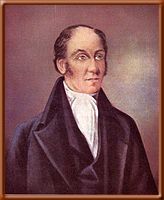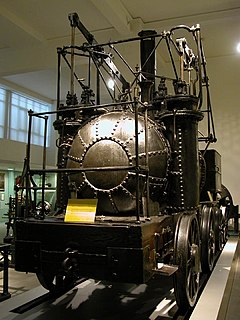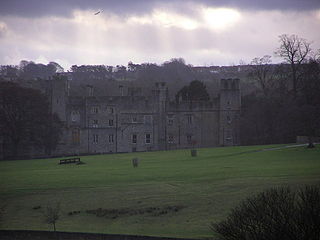Related Research Articles

Timothy Hackworth was an English steam locomotive engineer who lived in Shildon, County Durham, England and was the first locomotive superintendent of the Stockton and Darlington Railway.

Puffing Billy is the world's oldest surviving steam locomotive, constructed in 1813–1814 by colliery viewer William Hedley, enginewright Jonathan Forster and blacksmith Timothy Hackworth for Christopher Blackett, the owner of Wylam Colliery near Newcastle upon Tyne, in the United Kingdom. It was employed to haul coal chaldron wagons from the mine at Wylam to the docks at Lemington in Northumberland.

Wylam is a village and civil parish in the county of Northumberland. It is located about 10 miles (16 km) west of Newcastle upon Tyne.
There have been two baronetcies created for members of the Blackett family, both in the Baronetage of England. One creation is extant as of 2013. The Blackett family can be traced back to the Blacketts/Blakheveds of Woodcroft, County Durham, some of whom became highly successful in the lead and coal mining industries in Northumberland and County Durham.

Sir William Blackett, 1st Baronet was a landowner and politician who sat in the House of Commons in three periods between 1685 and 1705.

Sir Edward Blackett, 2nd Baronet was an English landowner and politician who sat in the House of Commons at various times between 1689 and 1701.
Sir William Blackett, 1st Baronet was a businessman who founded a mercantile and industrial base in Newcastle and a politician who sat in the House of Commons from 1673 to 1680.

Charles William Bigge was an English merchant and banker in Newcastle on Tyne.
The Brandlings of Newcastle were a wealthy family of merchants and land and coal owners in Newcastle upon Tyne and Northumberland.
The Chaytor family is an English gentry family on which has been conferred two baronetcies, one in the Baronetage of England and one in the Baronetage of the United Kingdom and several knighthoods. As of 2008 one baronetcy is extinct.
The baronetcy of Conyers of Horden was created in the Baronetage of England on 14 July 1628 for John Conyers of Horden, County Durham. An old name in the county, Horden had been spelt a number of ways, including Hordern and Hordin.

Beamish Hall is a mid-18th-century country house, now converted to a hotel, which stands in 24 acres (97,000 m2) of grounds near the town of Stanley, County Durham. It is a Grade II* listed building.

Witton Castle is a much-altered 15th-century castle, which is the centrepiece of a holiday and caravan country park at Witton le Wear, near Bishop Auckland, County Durham. It is a Grade II* listed building.
The Shafto family is an alternative surname for the Ffolliot family, who were established in the 14th century at Shafto Crag, Northumberland and adopted the alternative surname of Shafto.
Captain Sir Thomas Liddell, 1st Baronet (1578–1652) was an English politician, a member of the Liddell family which monopolized the local government of the North of England during the 16th and 17th centuries. He was one of the leading supporters of the Royalist cause in the English Civil War.
Sir Francis Brandling was an English landowner and politician who sat in the House of Commons from 1624 to 1625.

Christopher Blackett owned the Northumberland colliery at Wylam that built Puffing Billy, the first commercial adhesion steam locomotive. He was also the founding owner of The Globe newspaper in 1803.
Christopher Blackett was a British politician from Northumberland.
William Bigge (1707–1758) was an English lawyer, landowner and colliery owner.
William Brown (1717-1782) - or William Brown of Throckley as he was sometimes known - was an English mining engineer, waggonway constructor and steam engine builder who played a major role in the development of the coal mining industry in the North East of England and also elsewhere in Britain and Ireland.
References
- ↑ Burke, John. A genealogical and heraldic history of the commoners of Great Britain and Ireland. p. 258. Google Books
History of the Commoners of Great Britain and Ireland (1835) John Burke. Vol I pp 257-9 ( ISBN 978-0-8063-0742-8)